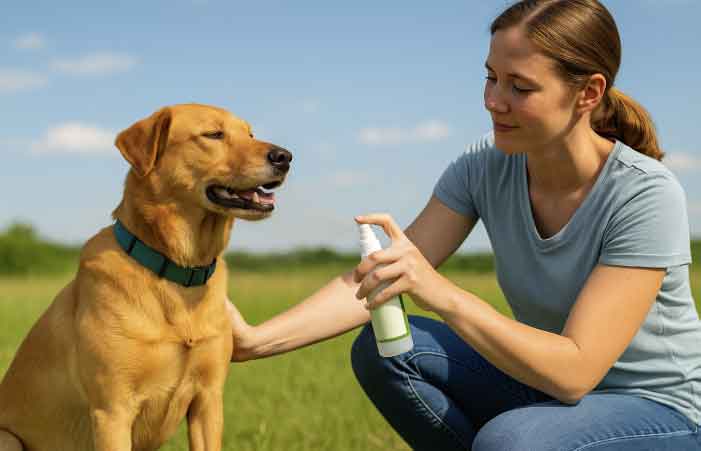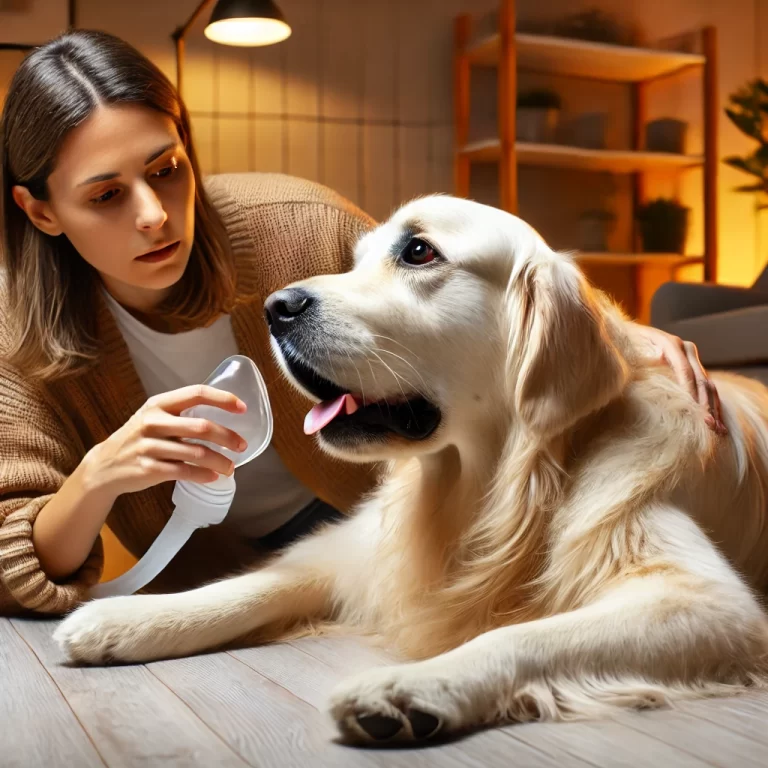Can You Put Bug Spray on Dogs? Safety Guide & Alternatives
Warm weather means more time outdoors—but it also means more bugs. If you’re wondering, “Can you put bug spray on dogs?” the answer isn’t as simple as yes or no. While you absolutely want to protect your pup from mosquitoes, ticks, and other biting insects, many human bug sprays are unsafe—or even toxic—for dogs. In this article, we’ll explain which bug sprays are safe, which to avoid, and the best ways to keep your dog bite-free without compromising their health.
Table of Contents
- Why Dogs Need Protection from Insects
- Can You Use Human Bug Spray on Dogs?
- Dog-Safe Bug Spray Options
- Ingredients to Avoid in Bug Sprays for Dogs
- Natural Bug Repellents for Dogs
- How to Safely Apply Bug Spray to Dogs
- Other Ways to Protect Your Dog from Insects
- FAQ
Why Dogs Need Protection from Insects
Insects aren’t just a nuisance—they can pose real health risks to dogs:
- Ticks: Can transmit Lyme disease, ehrlichiosis, and other infections
- Mosquitoes: Carry heartworms, which are potentially fatal if untreated
- Fleas: Cause itching, dermatitis, tapeworms, and anemia
- Flies and gnats: Bite exposed areas, especially ears and noses
That’s why using dog-safe insect repellent is essential, especially if your pet spends time in wooded areas, tall grass, or near standing water.
Can You Use Human Bug Spray on Dogs?
No, you should never use regular human bug spray on dogs. Most human insect repellents contain chemicals like DEET or Picaridin, which are toxic to dogs and can cause symptoms ranging from vomiting and drooling to neurological issues and seizures.
Why Human Bug Spray Is Dangerous for Dogs:
- DEET: Highly toxic to dogs; can cause tremors, seizures, and skin irritation
- Picaridin: Safer than DEET for humans but still not approved for canine use
- Aerosol inhalation: Spraying near a dog’s face or nose can irritate airways and eyes
If your dog has been accidentally exposed to human bug spray, contact your vet or poison control immediately.
Dog-Safe Bug Spray Options
1. Veterinary-Approved Sprays
These are the best option for effectiveness and safety. Look for sprays that specifically state they are safe for dogs and provide protection against fleas, ticks, and mosquitoes.
2. Natural Formulas
Plant-based repellents made with essential oils like lemongrass, cedarwood, or rosemary may be safer alternatives—but only if properly diluted and vet-approved.
3. Spot-On Treatments
Monthly topical medications like Frontline, K9 Advantix, and Revolution protect against fleas, ticks, and sometimes mosquitoes. These are applied to the skin and absorbed gradually.
4. Dog-Specific Collars
Insect-repellent collars (e.g., Seresto) are convenient and long-lasting, offering up to 8 months of protection.

Ingredients to Avoid in Bug Sprays for Dogs
Always read labels carefully. Avoid any product that contains the following:
- DEET – Toxic to the nervous system
- Picaridin – Not approved for pets
- Permethrin (for cats!) – Safe for dogs but deadly for cats; use caution in multi-pet homes
- Essential oils in high concentration – Tea tree, peppermint, clove, and citrus oils can be harmful
- Alcohol – Can dry and irritate the skin or be toxic if licked
When in doubt, consult your veterinarian before applying any product to your dog’s skin or coat.
Natural Bug Repellents for Dogs
DIY Natural Spray (Vet-Approved)
You can make a mild insect repellent at home using a few safe ingredients:
- 1 cup distilled water
- 2 tablespoons apple cider vinegar
- 5 drops of vet-approved essential oils (e.g., lemongrass or lavender)
Mix in a spray bottle and apply lightly to the coat—avoid eyes, nose, and mouth.
Other Natural Options:
- Neem oil spray (diluted)
- Lemon eucalyptus (vet-formulated)
- Geranium oil (in low doses)
Note: “Natural” doesn’t always mean “safe.” Always patch test and talk to your vet first.
How to Safely Apply Bug Spray to Dogs
Even with safe products, proper application matters. Here’s how to do it right:
Steps for Safe Application:
- Brush your dog’s coat to remove debris and loose fur
- Apply spray to a cloth or directly onto your hands, then rub into your dog’s coat
- Avoid spraying near the eyes, nose, mouth, and genitals
- Reapply as instructed—usually every 4 to 6 hours outdoors
- Keep your dog from licking the treated area until fully dry
Other Ways to Protect Your Dog from Insects
Bug spray isn’t your only defense. Combine strategies for maximum protection:
- Keep grass trimmed: Ticks and fleas love tall grass
- Use mosquito-proof screens: On porches and kennels
- Avoid peak insect hours: Dusk and dawn are high-activity times for mosquitoes
- Feed flea-prevention tablets: If recommended by your vet
- Check your dog’s coat: After walks, especially near wooded areas
FAQ
Can I use OFF! or Deep Woods bug spray on my dog?
No. These sprays contain DEET, which is highly toxic to dogs and should never be used on their skin or fur.
Are there any human bug sprays safe for dogs?
Most are not. Even those labeled as “natural” may contain essential oils or alcohols that irritate dogs. Always use products labeled specifically for canine use.
Can I use citronella spray on my dog?
Citronella is often used in dog collars for bark training, but in high doses it can cause respiratory irritation. Avoid using citronella as a bug repellent unless advised by a vet.
What is the best bug spray for dogs?
Veterinary-recommended products like Vet’s Best Flea + Tick Spray, Wondercide, or sprays from your vet are safest. Look for EPA-approved, pet-safe formulations.
Can I use essential oils to repel bugs from my dog?
Only with caution. Some essential oils like diluted lemongrass or lavender may be safe in low amounts, but others are toxic. Always ask your vet before using essential oils on your dog.
Conclusion
Can you put bug spray on dogs? Yes—but only if it’s made specifically for them. Never use human bug spray, especially those containing DEET or picaridin. These ingredients can be dangerous and lead to severe health issues in pets.
Instead, choose a vet-approved, dog-specific insect repellent or a mild, natural alternative that’s been confirmed as safe. When applied properly, these options can protect your dog from mosquitoes, fleas, ticks, and other pests—while keeping their skin and body healthy.
Before trying any new product or DIY spray, consult your veterinarian. Your pup will thank you for the bug-free adventures that follow!

